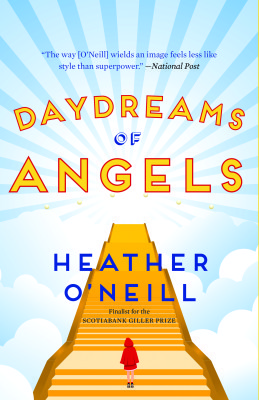Heather O’Neill’s first collection of short stories is an embarrassment of riches. Written alongside her acclaimed novels, Lullabies for Little Criminals and last year’s Giller-nominated The Girl Who Was Saturday Night, several of these stories originally aired on NPR’s This American Life and CBC Radio’s WireTap. While short story collections tend to feature a relatively even style and emotional palette, Daydreams of Angels offers readers a wide spectrum of both. In these twenty stories sparkling with wit and fantasy, O’Neill gives us a variety of genres, including heartfelt coming-of-age stories, miniature historical fictions, allegories, tall tales, and even literary cover versions. And while these stories largely stray from the gritty realism of her novels, they nonetheless retain the powerful emotional resonance of those works.
Daydreams of Angels is a collection of stories deeply invested in story itself and the power it has to shape lives. Several repurpose older narratives, turning them into compelling contemporary tales. In an adapted Bible story, “The Gospel According to Mary M.,” Jesus is cast as a Montreal schoolboy who turns apple juice into wine. Elsewhere, The Island of Doctor Moreau and The Story of O (in O’Neill’s version starring the Marquis de Sade as a young girl) receive their own retellings, giving these older texts a new relevance.

Daydreams of Angels
Heather O'Neill
HarperCollins
$22.95
paper
368pp
978-1-55468451-9
Daydreams of Angels also features a few stories that can be read explicitly as allegories for the creative process. In “Swan Lake for Beginners,” a group of Soviet scientists set up shop in the northern Quebec town of Pas-Grand-Chose to create a perfect clone of ballet dancer Rudolf Nureyev. While the clones are easily created, getting them to devote their lives to the art of dance proves more difficult, often hilariously so. In my favourite of these allegories, twins lost on a desert island send out messages in bottles every day in the hopes of being saved, with unlikely results. Here O’Neill meditates on how desperation fuels creativity and the unanticipated consequences of fame.
Fanciful elements are central to the collection, but in some of the most powerful stories we revisit the Montreal streets and realist style of O’Neill’s novels. “The Man Without a Heart” follows a poor young boy named Michal who strikes up a life-changing friendship with Lionel, a heroin addict, who encourages him to borrow the maximum number of books from the library every weekend. In another writer’s hands this story might veer towards sentimentality, but for O’Neill it is an opportunity to explore a unique friendship between two flawed characters.
Some of the stories in the collection are of course stronger than others, and some readers might not embrace the diversity of the material, but overall these dispatches from O’Neill’s imagination allow us to fleetingly see a world that is a little wilder and brighter than our own. The best stories in Daydreams of Angels brim with life, invention, and a rich understanding of how stories define us collectively and as individuals. mRb






0 Comments